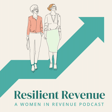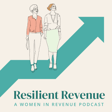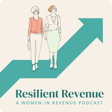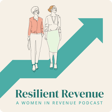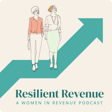Become a Creator today!Start creating today - Share your story with the world!
Start for free
00:00:00
00:00:01

More Than Metrics: The Human Element in Revenue Operations
In this episode of Resilient Revenue, host Kacyn Goranson is joined by Amber Williams from Ops Nectar to explore the intricacies of revenue operations (RevOps) and its vital role in B2B success. Amber shares her unique career path from studying biology to leading in RevOps, emphasizing the importance of systems thinking and resilience. Through her personal stories, she illustrates how foundational RevOps is to aligning revenue goals across teams and how overcoming setbacks has been key to her journey in tech.
Amber discusses:
- Transitioning from Science to Tech: How her background in biology and systems thinking translates into her approach to operations.
- RevOps vs. Salesforce Admin: Clarifies the differences between roles, emphasizing RevOps as foundational to business strategy and alignment.
- Common Misconceptions in RevOps: Explains why RevOps is more than “keeping the lights on” and how it requires alignment across go-to-market teams.
- Measuring Success in RevOps: The challenges of quantifying RevOps contributions and her approach to tracking impact through revenue goals.
- Resilience in Entrepreneurship: Insights on navigating layoffs, launching a business, and embracing the emotional rollercoaster of starting something new.
Key Links:
- Guest: Amber Williams: https://www.linkedin.com/in/amber-victoria/
- Host: Kacyn Goranson: https://www.linkedin.com/in/kacyngoranson/
This podcast is brought to you by Women in Renuve. If you’re a resilient woman in a revenue role and crave connection, join our community!
Transcript
Introduction to Resilient Revenue Podcast
00:00:01
Speaker
Welcome to Resilient Revenue, a women in revenue podcast series designed to magnify the voices, victories, and valuable insights of trailblazing women in revenue-generating roles. Each episode will showcase stories of resilience, mentorship, and self-advocacy. You'll learn exactly how these remarkable women are breaking barriers, redefining success, and showing us the transformative power of unity within the tech industry.
00:00:30
Speaker
So join us as we embark on this enlightening journey toward equality and empowerment in the world of resilient revenue.
Meet Amber Victoria Lahams
00:00:42
Speaker
i'm your host caseson gornson and today i am joined by amber victoria lahams from opsneter today ah dive a little bit into revenue operations thank you so much for joining us today Hey, Kacen. Oh, so great to be here. I'm a Women in Revenue super fan. Always happy to be part of everything and anything that the group does. So thank you for inviting me. Perfect. We definitely love to hear that and are so glad you're here today.
00:01:12
Speaker
So I guess just to start and kick off with love, a quick introduction and also a high level of your overall career path and journey.
Transition to Fractional Revenue Operations
00:01:21
Speaker
How did you get into revenue ops? Yeah, absolutely. Quick intro. it's I'm Amber Victoria. You can find me on LinkedIn at Amber dash-Victoria.
00:01:29
Speaker
And I've been doing fractional revenue operations, actually, I just started doing that in 2024. So a lot that we could unpack there, I was impacted by a layoff. And I said, Hey, I have this on my vision board, five year plan that I wanted to go off on my own and experience what that's like. But I thought that would be a few years away.
00:01:48
Speaker
But then I was pushed into it and in the environment with within B2B SAS, particularly the last couple of years. So I don't have much of a choice. So let me just go ahead and push myself. So it's been a huge learning experience, and but it's going really well. I'm super grateful for that. And my company is called Ops Nectar.
From Science to Tech and Operations
00:02:08
Speaker
But prior to starting this, I had been in operations my whole career, and I got into revenue operations about five years ago, and it's been really amazing. I've met so many great people, so many other women in revenue tangential roles.
00:02:24
Speaker
And I've learned a ton. And so I'm just really happy to be here and just always learning. But yeah, prior to that, I've always been a science nerd. So I'm a science, biology, science, genetics, chemistry. That's what I was really into growing up. So I never would have thought that I would be like in tech at all. But yeah, that's just how life works out when you follow what you're interested in.
00:02:48
Speaker
Follow your icky guy. Absolutely. And yeah, the world in B2B, SAS and tech the last few years has been absolutely insane. But I'm very happy for you that it has led to our sector and everything you are doing now. I would love to dig in a little bit more on how did you go from being a science and biology nerd to being just so passionate about operations?
00:03:13
Speaker
Yeah, like I said, I never would have thought that I would be a tech. I didn't see that path for myself because growing up, I never saw anyone, women particularly that were in technology. I wasn't really exposed to it, but funny enough, my grandpa, he did work for IBM for 30 years and I don't even know what he did for them, but He was around when like they had the big computers that took up the whole room and he would travel the world for them, but he never talked to me about his work, unfortunately. So I think that was a missed opportunity for me to get into computer science early on. But what I really loved was the natural environment. Of course, I still do. So with my undergrad, I studied evolutionary biology, which is all about systems.
00:03:55
Speaker
It's all about how different organisms in the environment interact and and what happens. What is the system? And so now I can reflect and look back and say, oh, that's how I got into operations because operations is all about systems and cause and effect and just designing your environment for your business to accomplish what you need to accomplish. And so looking back, I'm like, okay, that kind of makes sense. But in the thick of it, I was like, I don't know. I
Journey through Coding and Finding RevOps Niche
00:04:21
Speaker
just didn't want to go. I didn't want to go.
00:04:23
Speaker
on a PhD track because I didn't want to be stuck in a lab all day. And the field sort of biology positions just felt a little capped to me. So I ended up just working with local businesses early in my career and doing operations. And I was like, I didn't even know what operations was. But you just keep going and then you realize what you're doing. And then I went to a coding boot camp. I went to a coding boot camp. It was like a if you want intensive program programming, like just learned my first programming language. And so that was awesome because even though it didn't I didn't become a developer, again, really in the weeds head down sort of thing, I'm a more of a people person, but it really helped me transition from the services-based industry that I was in into technology. So that's when the revenue operations piece really kicked in and I was able to combine all those skills.
00:05:11
Speaker
There's so much in that connection that I could talk about, but I know we don't have all day, but I never in my life would have tried to connect biology systems to business systems. Yeah, you're like, okay, Amber, somehow you tried to make that work, but I'm not. It makes perfect sense. I love it. Maybe I just don't know enough about biology. I took astronomy in college as my required time. So maybe it's just- Yeah, I studied college. I studied business and marketing. So I have always been on the business and marketing track, which is where I'm like, wait, biology systems? What are you talking about? Yeah. you No, it works perfect. I love it. And I love that it has led you to just this rev of passion.
00:06:01
Speaker
entirely.
Understanding RevOps and Common Misconceptions
00:06:02
Speaker
So for those though who don't necessarily understand RevOps or even operations in general, because I think in my experience a lot of people do think they understand it, they talk about it, they know we need it, but they don't actually understand what it is in general. So what's one thing in the RevOps world that you would say people tend to misunderstand most often?
00:06:27
Speaker
Yeah, absolutely. so I think I have a privileged perspective case in coming from an operations background first and then pivoting into revenue specifically. I can say with operations, we just keep the lights on a lot of times. We're the ones who are just making sure that the business runs, customers get an email, like people get paid, whatever it is, we get paid.
00:06:49
Speaker
So that is comes with the territory with operations. it's like you're always It's always another thing. The work is never done. And you're just there to help make sure that everything works. right But with revenue operations specifically, we tie ourselves to revenue goals. And so one misconception that I see a lot is that sort of people who don't really know what it is or maybe they think that they do, i'm just thinking, oh, this is really simple. We can just get a revenue operation. person in here, they'll do some work in Salesforce, whatever, probably super quick, and then we won't have these problems anymore. When if you bring someone in who has the experience, they will probably uncover a lot more sticky than you were maybe expecting in terms of communication, alignment, all the way from the executive level all the way down. And so I'm a big proponent of first principles. And so it's really a foundation that you set as a business that
00:07:42
Speaker
really again has to come from a leadership executives in terms of how do we want to operate our company and so a lot of times the work that I end up doing for companies is very foundational because you could think about it as building a house right if you're building a house from scratch or to use that analogy you're starting with a really young startup right maybe they just raised their funding you're like building a house from scratch that comes with its own kind of problem but at least like you're building it from scratch, right? But if you come into a company that like I've done mid market, where there's been leadership change over the years, right? And there's been systems changes and you have a 15 year old Salesforce instance, that's like coming into a house that has been well loved and maybe have some problems. And so to think that the house is just gonna
00:08:25
Speaker
start functioning like right off the gate, so you might actually have to do some work on the foundation. You might have to do some work in the basement even. like These things that people don't want to talk about, they just want to cover them up. so I think that it tends to be a very foundational thing that has to touch all the go-to-market teams. Ideally, we all align on our revenue objectives and our objectives for the company. But yeah, it's like thinking that it's a small thing when it's actually the foundation of your business. I would say that's a big misconception.
00:08:54
Speaker
No, I absolutely love that. Couldn't agree more. its Everything's built on it. But so as you were talking, I was reminded from an example from a past life where there was some data integrity issues at this company. Not a lot of transparency into where numbers were, where was revenue, anything there.
RevOps vs Salesforce Admin Roles
00:09:15
Speaker
And there was some general disagreement on should we hire a RevOps consultant or full-time person, anything there. Or did we really just need a Salesforce admin? Would love your opinion or clarification on kind of the difference there or when do you need, who comes first? Is it RevOps or is it a Salesforce admin?
00:09:40
Speaker
Yeah, definitely. With the administrative piece, I have unending respect for what those people do, especially if you're talking about Salesforce. You could have degrees in terms of being a Salesforce architect, in my opinion. So there's a lot that goes into that, but it really is two different questions. So if you're having problems, in your words that you mentioned, Caitlin, to use this example of data integrity, revenue, visibility, trust,
00:10:08
Speaker
Those are pieces that we really start to get into more of the the foundation of how the company works and how communication across departments is working or not working. So with data integrity, yeah, that could be something where maybe it's a system that we implement and you just start requiring some fields and then boom, now you have your data.
00:10:28
Speaker
is there, but does it mean that the data is accurate? Okay, now we get into the piece around training and enablement and following up with teams to make sure that the data that they've entered is an accurate reflection of what's actually happening.
00:10:43
Speaker
in the company and not that just that they're using certain properties because they need one thing to one person and a different thing to a different person. So that's when you really start to get out of the scope of what an admin is really there to do. So in my experience, companies do sometimes put a lot of more burden on an admin than they realize by expecting that admin to be not only doing the the process, building it out and making sure that it functions properly with an app of them, but they're also unknowingly asking that admin to also understand their business, their go-to-market strategy, to also understand that far-reaching implications
00:11:23
Speaker
across the entire customer journey, which is just not in the job description for someone who's doing an admin work. They're best suited to architecting and carry out a plan that's been asked of them. So that's where the breakdown really comes as if you're thinking again, that this is just something where you can go change some fields.
00:11:40
Speaker
Moving some stuff around, that is definitely a lot of work, and I'm not trying to discount that. But where a Salesforce admin may fall short, and depend on your Salesforce admin, is their ability to really see the full picture and all of the implications for the business and revenue, which you have to have experience working across the different go-to-market teams.
00:12:02
Speaker
to really understand those implications and understand what the root cause of the problem is. Because it's never just a technology, right? Because we interact with it. We're responsible for our data and like what it's like. So more often than not, it's a human problem, not just a technology problem.
00:12:21
Speaker
Perfect. No, I couldn't agree more. I think especially when it comes to processes, systems, there's an educational component, or you're going to constantly have to change the system, the process, because you're right. We're human. We're going to make mistakes. We're going to have errors, or there's going to be turnover in the company or new employees. It's like a game of telephone and business. i thought we were supposed to do it this way so I told him to do it this way and eventually the message gets around entirely wrong. So I think it's the educational piece that is also so important because how often is it, especially on anything operational, you think you're asking for something simple and the something simple is not because of everything under
00:13:11
Speaker
Yeah, I love that. I love the way that you said that. It's like very eloquent. But yeah, another way of saying that is the dependencies, right? So you need someone who can really wrap their head around the requirements um from the CMO versus their requirements from the sales director and be able to translate those business requirements. And we call that enablement as well, right? So coming in fresh to an organization, one of the first things that I will always do is make sure that i I get in good with the leadership at the company to really understand what are their goals because that's how you make friends, right? You make sure that you understand how to help someone not just look good, but like how to help them actually perform and how to show how their team is performing. So sometimes marketing and sales have different metrics.
00:13:57
Speaker
or they always do typically have different metrics, even though we're all working towards revenue, right? Which is really one metric. So we have different sort of incentives across these departments. And so if the teams aren't set up for success in terms of communicating what they're struggling with and really just breaking down those barriers to communication as a big piece, because especially if you're not starting from scratch and building a house from scratch, you're probably going to come in and you're immediately going to be up against create existing bias based based on experience, based on other jobs, different things, right? So just clearing the way and setting a foundation of, hey, you tell me that this matters to you and now I understand that and I'm going to follow through, right? A lot of times, SLAs are just missed opportunities to follow through. Sometimes it happens because there's no one there to really pick up that.
00:14:48
Speaker
black and so revenue operations does do that a lot but just making sure that everyone's voices are being heard as well because
Key Responsibilities of RevOps
00:14:55
Speaker
that's another thing that doesn't work when it comes to training and enablement or implementing a new system. If you didn't do your due diligence to check and see what's really broken with the current system from the perspective of not just the marketing leader but also the SDR, right you have to understand what the problems are for their perspective too because you can't see everything. And if you're building ah a new solution or a new process, it has to work and actually solve people's problems, not just meet your reporting requirement. like In order for them to do the process and adhere to the process for data integrity purposes, for example, it has to be built for them in a way that works for them as much as possible. So that's something that, for example, an admin is just not ah well-equipped to do that unless they're learning on the job.
00:15:41
Speaker
Perfect. So you touched on revenue as basically the ultimate KPI. Would love to know how you have shown that RevOps is actually impacting that revenue. Yeah, absolutely. That's the million dollar question, right? Because when you come in as an operations person, hey, here, I do everything that I ask you to do. But when you show up as a revenue operations person, there is that expectation of, oh, this person is going to help.
00:16:08
Speaker
move the needle for us in our business. So how we do that, how I do that is again, I attach myself to those big foundational goals and strategies at the high level first. So I need to understand what did we set as our goal for the year revenue wise, churn wise, do we know our conversion rates,
00:16:30
Speaker
across, you know, our pipeline and our funnel. Are we trying to improve a certain conversion rate? If we don't know those, that's a great way to go ahead and add value is to surface visibility across the end to end life cycle. But it really is just, yeah, getting down and nitty gritty and saying, okay, I'm not going to reinvent the wheel here. What do the leaders in the business say are our goals for the year? And so then how are the different teams contributing to that?
00:16:56
Speaker
And how am I going to attach myself to the highest value, biggest potential impact projects and really show, because that's how you can really show our ROI is not by being involved in every single thing or putting out every single fire, but attaching yourself to the biggest problems that the business is facing in order to meet those goals. And so that does take some prep and some planning and some strategic planning to say, Hey,
00:17:22
Speaker
Let's take a beat. Let's build this roadmap and make sure that we're iterating on it. It doesn't say, does it mean that if we set these goals for the next six months, then revenue operations is never going to do anything else. But it really does help to show value when you go back and evaluate performance and you're able to say, Hey, I captured this conversion rate. And then.
00:17:42
Speaker
through our work, six months later, now we have this conversion rate and you can tie that back to revenue really easily. So it takes a lot of discipline and it's something that I'm still learning how to do. That's a hard part for sure. No, I absolutely love that. Especially as you are still learning pieces, I think RevOps is always changing and operations too. What about for people who aren't in operations and want to learn more about RevOps or how to get into it? What would you tell them?
00:18:09
Speaker
Yeah. So if you're not in operations and you want to get into revenue operations, I would say, what is your background? And just think about how you can leverage your current experience to add value in a revenue perspective where you are right now. So I came from up, but if you're, for example, in a sales position or a marketing position, or really, I would say any other go to market influencing position, then you're in a great place to add value.
00:18:34
Speaker
through revenue operations. You might be a good fit for it if you really love working with people and you have a really high level of patience and understanding. And if you can learn really quickly, those I think are some of the things that have helped me a lot. But what I would say to people who are wanting to get involved is go out on LinkedIn or out in your community and find people who are practicing revenue operations and just reach out to them. So we are really connected group of people. There are different groups that you can join such as RevOps, Co-op, that's a great group to join. People oftentimes will just meet with you and have a 15-minute coffee chat and they could tell you about their experience. I'm happy to do that as well for anyone listening, but I think once you start to understand the different responsibilities for the role, then from there I would just take that and see how you can apply that to where you are right now because
00:19:28
Speaker
lesson but I don't know if I was clear, but I did all this learning like on the job. right No one came and told me, like hey Amber, we're going to pay you to like learn revenue operations for a year or two years. like I had to learn it all myself as I went along and then you can just prove the value and that gives you leverage. But sometimes you have to really put in that work upfront where maybe it's not in your job description or your title or maybe your moonlighting just to try to get a grip on it as a contractor. There's so many different ways you could do it, but don't wait until you think that you have it figured out to reach out for help or to try something. Yeah. No, I think you hit the nail on the head with a lot of it's learning on the job and teaching yourself.
Amber's Resilience Journey and Business Launch
00:20:12
Speaker
I think everyone I know in any sort of ops, role, robots, marketing ops, sales ops, they all had to teach themselves and learn as they went. So you were not alone in that experience. So last question for our time together. I have a feeling you touched on this at the very beginning, but would love to know what does resilience mean to you?
00:20:38
Speaker
Oh my gosh, whole podcast, right? That's like a whole interview in and of itself. But I think that Caitlin, I thought I knew what resilience was prior to 2024. And I thought that I was a resilient woman. But this year has taught me like a whole other level of what resilience is. Yeah, I mentioned the layoff. I was actually my second time being laid off. So the first time I was laid off, I was five months pregnant.
00:21:05
Speaker
And I was like, what the F am I going to do? Right. And so then you I just, its it was the hardest thing I had ever done to reposition myself, to have that confidence. I worked with a coach, like so helpful to work with someone who you trust, who can help you with results.
00:21:21
Speaker
She helped me double my income for my next role. So I was like, I'm good. So it's just so hard to be resilient when you're in the face of something that's so difficult and scary. And so I was like, you're never going to have to go through that again. Wrong. Lay it off again. And at that point, I was like, man, I just bought my first house. I have all this liability. And it's just hard. Life is hard.
00:21:44
Speaker
And there are points where I just like, sometimes I just cry. Some days I'm like, give this in the morning, especially earlier this year. By the afternoon, I'm like, ooh, I have all this energy. Like, I can do this, I can do this. And so it's really just being patient with yourself and understanding that you can get back up and just keep going. does It doesn't mean that you're not affected by things that happen to you or hardships that you face, but it's just about picking yourself back up and keep going and believing yourself because I can tell you,
00:22:12
Speaker
my experience growing this very young business that I have, I didn't see really any results for the first six months. And so over those first six months, I was going through an emotional roller coaster. Like I said, every day I was like, I suck. I can't do this. I suck at sales. And then I would be like, oh, okay, I can do this. I see some traction. I love doing this. I'm very creative. I can market myself and sell myself. And then it was just like a roller coaster, but things start to even out over time. So I'm really grateful.
00:22:41
Speaker
or that but it's just about getting back up honestly and I think I could ask for help more for my community is one thing I could do more of so I'm trying to get better at that but I don't know if I'm not resilient at this point I'm like I don't know what resilience is.
00:22:57
Speaker
It sounds to me like you are very resilient and you have a new baby business object connector out of it. So yeah yeah, I think that's definitely the definition of
Closing and Community Invitation
00:23:08
Speaker
resilience. So thank you for sharing that and thank you for all of your insights on revenue operations with us today. If anybody wants to get in touch with Amber Victoria, remember you can find her there on LinkedIn. She would love to connect, but Amber, thank you so much for your time today and joining us.
00:23:26
Speaker
Thank you, Kacen, and thank you to the women in revenue community. It's great to be a part of it. So yeah, let's do this. And that wraps up another episode of Resilient Revenue. These narratives are more than just personal triumphs. They embody the collective journey that we undertake as we strive for a future where every woman, no matter her career stage, location, industry, or demographic profile, has the opportunity to ex excel in her chosen field.
00:23:56
Speaker
Women in revenue exists because we know amazing things can happen when driven, talented, bottom line oriented women are fired up and collaborating to grow their careers and organizations. We invite you to join our amazing community of 7,000 plus members. If you'd like to become a member for free, head on over to womeninrevenue.org to join today. See you next time on Resilient Revenue.
